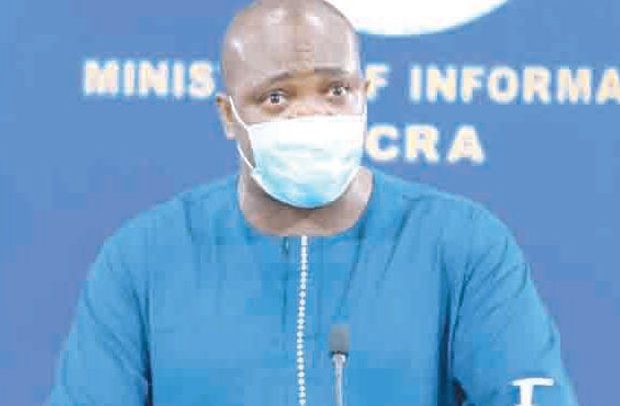Isaac Kwame Asiamah
Government has lifted restrictions on certain categories of sporting activities.
The move, according to Sports Minister Isaac Kwame Asiamah, is to enable athletes to well prepare.
However, those activities are to be carried out in non-contact manner.
The sports permitted are table tennis, gym, tennis and athletics.
However, kick-boxing, boxing, football, volleyball which require some degree of contacts are still not allowed to commence, the minister said.
“Accordingly, in line with the presidential directives, restrictions on the following individual and non-contact Olympic sporting activities are lifted with immediate effect,” he stated.
Sports allowed to train include athletics, badminton, baseball and softball
Chess, cricket, cycling, golf, gymnasium (gym), individual non-contact para-sports, keep fit clubs (100 persons limit), polo, powerlifting, scrabble, shooting, snooker, swimming, table tennis, tennis, water sports and weightlifting.
“No team events like relays in athletics and doubles in badminton, table tennis and tennis are permitted. Only trainings are allowed in the above stated sports disciplines. No caddies (bag carriers) are permitted to accompany (carry bags for) golfers during training,” he said.
The easing of restrictions and the guidelines are all measures to allow athletes develop the necessary “match fitness” they need to position themselves in readiness for competitions at the earliest opportunity when it is safe to do so, according to him.
“There is still a restriction to mass gathering. Therefore, there will be no events or competitions until further notice. The restrictions on all other sporting disciplines are still in force. Specifically, the following sports disciplines are under restrictions:
Restricted Disciplines
Sporting disciplines not allowed to train are armwrestling, basketball, beach soccer, beach volleyball, boxing, fencing, football, judo, karate do, kickboxing, netball, rugby, squash, taekwondo, volleyball and wrestling (traditional).
Measures
The National Sports Authority (NSA), in collaboration with the Ministry of Local Government & Rural Development, he said, undertook a nationwide fumigation in all the stadia across the country.
“Offices, spectating sitting area, VIP lounge among other areas have been fumigated.”
Going forward, he added that these general protocols should guide individual non-contact sports. Organisers are, thus, required to ensure that these protocols are observed:
- Check temperatures of participants before entering training premises as necessary.
- Always enforce mandatory wearing of masks (‘No Mask: No Entry’ policy).
III. Hand washing facilities with running water and soap and/or approved alcohol-based hand sanitizer should be made available.
IIII. Adequate waste management facilities (bins, cans, bin-liners, and single use tissues) must be provided.
- Regular cleaning and disinfection of frequently used communal places (like bathroom and toilet surfaces) and frequently touched surfaces such as doorknobs/handles, door handles, switches of fans, lights, tables, chairs and gym equipment preferably every one to two hours depending on the rate of utilization.
- Display approved health promotion materials on COVID-19 at vantage points to remind people to keep to social distancing protocols, wearing of the masks, regular hand washing, coughing and sneezing etiquette.
VII. Introduce a no handshake policy, no hugging, and no spitting policy
VIII. Disinfection/fumigation of sporting facilities and fields.
- Fans and spectators are not allowed during this period until further notice.
- Personal items to be used exclusively.
- For gym equipment – clients are to use only one piece of equipment at a time (i.e., no circuits or ‘super setting’) so that machines are cleaned after each use
XII. Our facilities have standby ambulances with paramedics who are ready to dispense first Aid as and when the need arises.
XIII. Keep register of athletes, instructors and trainers at all sporting facilities, fitness clubs and gyms.
“This register should include athlete’s name, time of arrival, departure and contact phone number.”
Enforcement
National Sport Authority (NSA), in collaboration with Ghana Health Service officials, according to him, shall take enforcement responsibilities. This means regulatory bodies for the different sectors and where necessary assisted by state security services shall be engaged to ensure enforcement and monitoring.
“Random enforcement checks will be undertaken to ensure compliance. None conformance may lead to penalties being awarded and /or closure of event.”
Monitoring & Evaluation
“Government will continue to monitor and evaluate key indicators to establish the transmission levels of the virus. The approach will include benchmarking and rapid learning to inform decision making and tactical adaptations to the overall strategy and hotspot specifics,” he said.
Contingency Arrangements
Should there be an unexpected outburst in infections within sports facility or unit, government has put health workers and the security services, including the Police Service and the Armed Forces on standby to co-ordinate a rapid response of human and logistical resources, if necessary, to cordon, impose a curfew, trace, test, and treat infected persons in the affected community, he said.
PIX: ASIAMAH COVID


